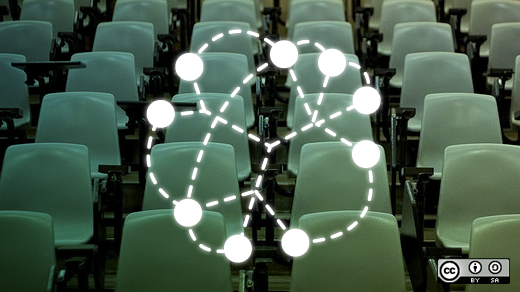While I read Opensource.com article "Goodbye Henry Ford, hello open organization," a line describing traditional organizational structures as "rigid and slow to adapt" with "silos and lack of communication" caught my eye. Those words could well describe the PK-12 education sector, where I spent many years.
You see, public education is run by benevolent bureaucrats, most of whom never set foot in a classroom. Policy is passed from federal and state legislatures to local boards of education and eventually to schools through administrative teams who oversee teachers and students. All communication in the system is top-down—there is no effective communication that goes in the opposite direction.
There was a time when such a system might have made sense (in the industrial age). Today we live in a post-industrial society, and in a marketplace where communication and collaboration are essential to survival. Therefore, education needs a new model for management. I think the ideas Jim Whitehurst outlines in The Open Organization could have implications in education.
Early on in the book, Jim tells a story:
I issued what I thought was an order to create a research report. A few days later, I asked the people assigned to the task how things were going. "Oh, we decided it was a bad idea, so we scrapped it," they told me in good cheer."
I cannot imagine that sort of a scenario playing out nicely in an educational organization. The PK-12 education system mirrors the Henry Ford model of top-down management. Most of what I observed over the course of my career was stratification with administration at the top, teachers in the middle, and non-teaching staff at the bottom. All policy originated at the top and trickled to the bottom.
The open organization that Jim writes about fosters cooperation and collaboration. This is frequently spoken of in education circles, and many speak of cooperative learning, but that only involves teachers and students. Since the purpose of education is to prepare students to be productive in our society, it makes sense that we ought to be preparing them for the future which will include much more open organizational structures.
As an educator, I believe that the sharing and open culture of Red Hat marks a welcome paradigm change that invites replication in the education sector because it points forward. Education is essentially about leading others and instilling values and practices that benefit the learner and—we hope—society over the long run.
In the recent past, students came to school and were told that working hard, getting good grades, and college admission led to employment. Now most students and their parents know that this formula no longer works. However, the educational bureaucracy continues to put students through the Henry Ford model, which produces easily counted widgets but results in dysfunction and dystopia.
The current emphasis on raising standards in education misses the point. We should raise standards, but more importantly we need to change the paradigm and fundamentally change how students are educated. We need schools where creativity is celebrated and the principles outlined in The Open Organization do provide ideas and principles which could be applied to education from pre-kindergarten to college.
Imagine schools where passion and engagement drive the learning and assessment equation. Typically, students who excel are rewarded while those who don't do well are discouraged to say the least. Part of the Red Hat culture is "fail fast," which is a recipe for real learning because it celebrates failure, the true key to success.
It's okay to fail in an open organization, and people are encouraged to own their failures and be accountable for them. That's an invitation to integrity and character education. Real learning involves cognitive dissonance. Tinkering and making are meta-cognitive skills that celebrate this type of learning. We learn to walk, to ride a bicycle, to program a computer by trial and error.






Comments are closed.